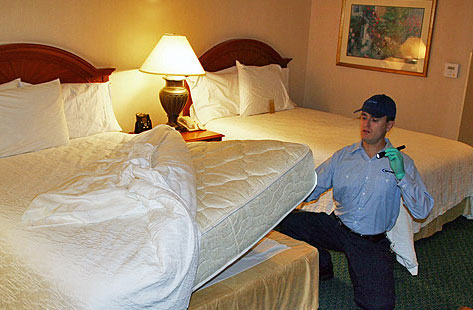Garbage disposals are often unsung heroes in our kitchens. We rely on them every day to grind up food scraps and keep our sinks clean. But when something goes wrong, it can quickly turn into a frustrating situation. If you live in Naples, FL, and are facing issues with your garbage disposal or clogged drains, don’t panic. Whether it’s a jam, a leak, or slow drainage, there are steps you can take to get things back to normal without calling in a professional right away.
In this guide, we’ll walk you through some actionable tips for garbage disposal repair in Naples, FL and how to handle clogged drain repair in Naples, FL. These tips are simple, easy to follow, and can save you time and money. Let’s dive into the world of garbage disposals and drain care!
Understanding Common Garbage Disposal Problems in Naples, FL
Before you start trying to fix your garbage disposal, it’s important to understand what might be causing the issue. Here are some common problems homeowners in Naples, FL face with their garbage disposals:
Jammed disposal: This happens when food or foreign objects get stuck in the blades, preventing them from spinning.
Leaks: If you notice water pooling around your disposal unit, it could be leaking from the seals or pipes.
Slow drainage: This can be caused by a clogged drain, either in the disposal itself or further down the pipes.
Unpleasant odors: This can happen when food particles get stuck in the disposal, leading to bacteria growth and bad smells.
Once you identify the issue, you can either take action yourself or consider calling a professional for garbage disposal repair in Naples, FL. Here’s what you can do to fix it!
Step-by-Step Tips for Garbage Disposal Repair in Naples, FL
Unclogging a Jammed Disposal
A jammed disposal is one of the most common issues. If your disposal isn’t turning on, the blades may be stuck. To fix this:
Turn off the power: Always unplug the disposal or turn off the circuit breaker to avoid injury.
Use a hex wrench: Most disposals come with a hex-shaped wrench that fits into a hole at the bottom of the unit. Use it to turn the blades manually until they move freely.
Clear out debris: If there’s food or a foreign object stuck in the disposal, use tongs or pliers to remove it. Never use your hands.
Dealing with Leaks in the Disposal
Leaks are another issue that can occur with garbage disposals. These are typically caused by worn-out seals or pipes. To address leaks:
Check for leaks around the sink: If you see water around the base of the disposal, it might be coming from the mounting assembly or the connection to the drain.
Tighten loose connections: Use a wrench to tighten any loose bolts or pipes. Be careful not to overtighten, as this can cause damage.
Replace worn-out seals: If the leak is coming from the seals, you may need to replace them. This may require professional help if you’re not comfortable with DIY repairs.
Fixing Slow Drainage
If your garbage disposal is working fine, but your sink is draining slowly, it’s likely due to a clogged drain. This can happen when food particles build up in the pipes. Here’s how to fix it:
Use a plunger: If the sink is only draining slowly, try using a plunger to clear the obstruction. Be sure to cover the overflow hole with a wet cloth to create a good seal.
Use a drain snake: If plunging doesn’t work, a drain snake can help remove deeper blockages. Insert the snake into the drain, twist, and pull out any debris.
Clean the P-trap: The P-trap under your sink can also get clogged with food particles. Use a wrench to loosen the trap and clear out any debris that might be causing the blockage.
Eliminating Bad Odors
Garbage disposals can sometimes develop foul smells due to leftover food particles. Here’s how to freshen up your disposal:
Clean with ice cubes and salt: Put a few ice cubes and a small amount of salt into the disposal and run cold water while grinding the ice. This helps clean the blades and remove odors.
Use baking soda and vinegar: Pour a cup of baking soda down the disposal followed by a cup of vinegar. Let it sit for 10-15 minutes, then rinse with hot water to remove odors and grime.
Citrus peels: Grinding citrus peels (like lemon or orange) can help neutralize odors and leave your kitchen smelling fresh.
When to Call for Professional Garbage Disposal Repair in Naples, FL
While some of these tips can solve minor issues, certain problems require professional help. Here are some signs that it’s time to call a plumber or technician for garbage disposal repair in Naples, FL:
Persistent leaks: If the leaks won’t stop despite your best efforts, it’s time to call in a professional to inspect the unit and replace any damaged parts.
Electrical issues: If your disposal is still not turning on after you’ve reset it and checked for jams, there could be an electrical issue that needs expert attention.
Major clogs: If your drain is still clogged after you’ve tried to fix it yourself, there may be a deeper issue in the plumbing that requires professional tools.
Tips to Prevent Garbage Disposal Issues in Naples, FL
Prevention is key when it comes to avoiding clogged drain repair in Naples, FL and future garbage disposal problems. Here are some helpful tips:
Don’t overload the disposal: Only put small amounts of food waste down the disposal at a time.
Avoid fibrous foods: Foods like celery, corn husks, and potato peels can wrap around the blades and cause jams.
Run cold water: Always run cold water while using the garbage disposal to help solidify any grease or oils and prevent clogs.
Regular cleaning: Keep your disposal clean by grinding up ice cubes, citrus peels, or using baking soda and vinegar regularly.
Final Thoughts
When it comes to garbage disposal repair in Naples, FL and dealing with clogged drains, knowing how to troubleshoot and fix common issues can save you time and money. Whether you’re dealing with a jammed disposal, a slow drain, or unpleasant odors, following the steps outlined in this guide can help you get back to enjoying a smooth-running kitchen.
However, if the problem persists or if you’re unsure about handling the repair yourself, don’t hesitate to call a professional. They can quickly diagnose the issue and get your garbage disposal and drains working as they should.



